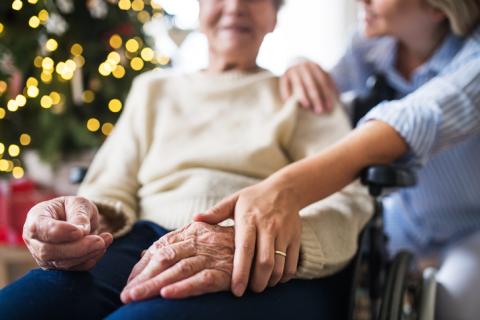Hosting the Holidays When a Loved One Has Alzheimer’s Disease
Before the visit
If you are the family member who traditionally hosts the celebration, adjust your plans accordingly. In previous years, you had more hours to spend decorating, shopping, baking and preparing your home for overnight guests.
But now, you may have your hands full with your loved one’s care. Explain that you will need to simplify and ask others to pitch in with the preparations. Maybe someone else can host. Or make the holiday meal a potluck. Perhaps other family members can stay with your loved one while you shop and do errands.
As much as you can, let your loved one help you with baking, decorating and wrapping presents. They might still have memories of holidays past. Encourage them to share their thoughts, even if their memories aren’t accurate. Listen to favorite holiday music together. Show your loved one photos of the guests who will be arriving and talk about who they are.
If family from out of town haven’t seen your loved one in a while, communicate with them before the visit about how the disease has changed your loved one and what they should expect. The more at ease guests are, the more able they will be to connect with your loved one.
This is especially important if children will be at the gathering. Explain to children that their relative has an illness that makes it hard to remember things. Tell them that it’s fine to ask you questions about it. Children can be frightened and confused by changes in a beloved grandparent or other relative. Yet interactions between young children and people with dementia can be simple, sweet and emotionally rewarding as they connect on their own special level.
When the guests arrive
Encourage guests to introduce themselves to your loved one at every encounter, and not to take it personally if your loved one doesn’t remember them. Make festive name tags for visitors. Give guests some tips for communicating with and including the person who has Alzheimer’s. The National Institute on Aging (NIA) offers these tips:
- Help family and friends realize what your loved one can still do and how much they can understand.
- Give visitors suggestions about how to start talking with your loved one. For example, make eye contact and say, “Hello, Aunt Ellen! I’m Jenny, your niece.”
- Advise guests to avoid correcting the person with Alzheimer’s if they make a mistake or forget something. Instead, ask visitors to respond to the feelings expressed or talk about something different.
- Help family and friends plan fun activities with your loved one. A photo album or other activity can help if your loved one is bored or confused and needs to be distracted.
- Arrange for your loved one and children to set the table or work on a simple craft project.
Be aware of how your loved one is doing
Some holiday traditions may be difficult for people with dementia. This year, make things more low-key, and be alert for signs that your loved one is distressed. Avoid noise and crowded gatherings. Try to adhere to your loved one’s usual schedule for eating, sleeping and resting. It might be better to have a few family members visit at a time rather than large groups. During gatherings, arrange for a place in the house where your loved one can retreat if they become overwhelmed.
Safety considerations
You may also need to adapt your traditional holiday decorations to keep your loved one safe. For example, blinking lights can be disorienting for a person with dementia, so use only lights that don’t flash. Avoid decorations that could be mistaken for food. Don’t leave your loved one alone with a lighted menorah or lighted fireplace. And be mindful that extension cords and clutter could cause a fall.
People with dementia may forget the particulars of the holidays, but the emotions last. And for other family members, having kept your loved one included in this way may well turn out to be a warm, long-lasting memory full of holiday spirit.
